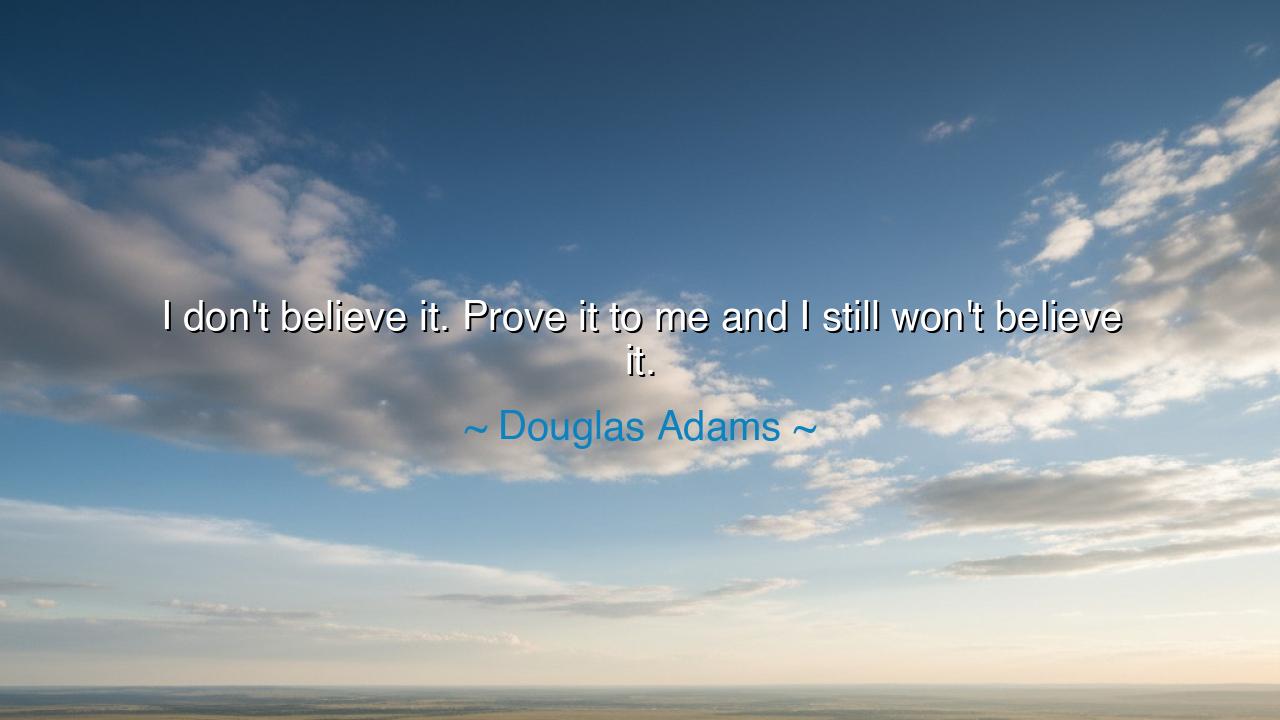
I don't believe it. Prove it to me and I still won't believe it.






Douglas Adams, with the wit of a trickster sage, once declared: “I don’t believe it. Prove it to me and I still won’t believe it.” At first glance, these words seem like a jest, a playful paradox tossed into the air. Yet beneath the laughter lies a profound meditation on human stubbornness, on the limits of evidence, and on the nature of belief itself. Adams, master of irony, was showing us that there are some minds that cling to denial even when the very universe lays its proof at their feet.
The ancients would have recognized in this quote a warning: facts alone cannot move the soul that is unwilling. One may lay out proofs, draw maps of the stars, reveal the hidden laws of nature, yet if the heart is closed, no evidence will suffice. This is the tragedy of the human spirit—belief is not merely the acceptance of proof, but the surrender of the will to truth. Where there is no openness, even mountains of proof crumble into dust.
History gives us vivid examples. When Galileo looked to the heavens through his telescope, he saw moons circling Jupiter, proof that not all things revolved around the Earth. He showed his findings to scholars and priests, but many refused to accept it. Even with the proof before their eyes, they said, “I do not believe it.” Their minds were bound not by the stars but by fear, tradition, and pride. Thus, Adams’ ironic words echo through time: one can prove what is true, and still be met with disbelief.
But there is another side, both humorous and tragic: sometimes Adams’ phrase reflects our instinct to cling to what comforts us, even against all reason. Consider the warnings of scientists about climate change. The data is vast, the proof overwhelming, yet many declare, “I do not believe it.” This refusal is not born of logic but of desire—desire for ease, for denial, for the world to remain as it was. Here, disbelief becomes an armor against the burden of truth.
And yet, Adams’ wit also contains a playful liberation. For it teaches us not to take ourselves too seriously, not to assume that proof alone is enough to transform lives. Belief is a dance between the rational mind and the deeper self. It requires not only evidence but humility, imagination, and courage. Without these, one can be shown the stars themselves and still insist the sky is empty.
The lesson is clear: to live wisely, one must learn not only to demand proof but to cultivate openness of heart. Ask yourself—when faced with evidence that challenges your comfort, will you retreat into denial, or will you grow? To seek truth requires not only logic but bravery: bravery to let go of what you wish to believe, and to step into what is.
Practically, this means cultivating the discipline of reflection. When you encounter something new, do not dismiss it too quickly. Ask: “What if this is true? What would it mean for me? What must I change?” Be humble enough to accept that your beliefs are not unshakable. At the same time, be strong enough to test claims with reason. This balance—skepticism joined with openness—is the path of wisdom.
So remember Adams’ paradox: “I don’t believe it. Prove it to me and I still won’t believe it.” Laugh at it, yes, for it is comic. But also heed its warning, for it reveals the folly of closed hearts. Proof without openness is useless; truth without humility is unseen. Let your mind be sharp, but let your heart remain open, so that when proof is offered, belief may grow—not in blindness, but in wisdom.






TNB7.28. Han Thi Nguyet
Douglas Adams' words remind me of how difficult it can be to shift someone’s mindset, even with the best arguments or evidence. Is it possible that some people are so attached to their beliefs that no proof can ever be enough? How do we navigate conversations with those who have such firm convictions, and how do we reconcile this with the need for open-mindedness and change?
TPLeu thu phuong
This quote makes me think about the limitations of logic and proof. Sometimes, no matter how much evidence you present, a person’s conviction doesn’t change. Is it possible that belief isn’t just about evidence, but about emotional or psychological factors that influence how we perceive the world? How can we ever really 'prove' something to someone who isn’t open to changing their perspective?
PCTran Phuong Chi
I find Adams' quote both humorous and thought-provoking. It highlights the idea that some people’s beliefs are so entrenched that no amount of proof will convince them otherwise. But why do we hold on so firmly to beliefs, even when presented with irrefutable evidence? Is this a matter of ego, fear, or simply a refusal to change? How do we approach those who are stubborn in their disbelief?
MNMinh Nguyen
Douglas Adams' quote is a fascinating commentary on skepticism and the limits of proof. It’s as if he’s saying that belief is not always based on evidence but on something deeper. But is it really possible to disprove something to someone who refuses to believe, even in the face of overwhelming evidence? What does this say about the nature of belief and the human tendency to cling to personal biases?